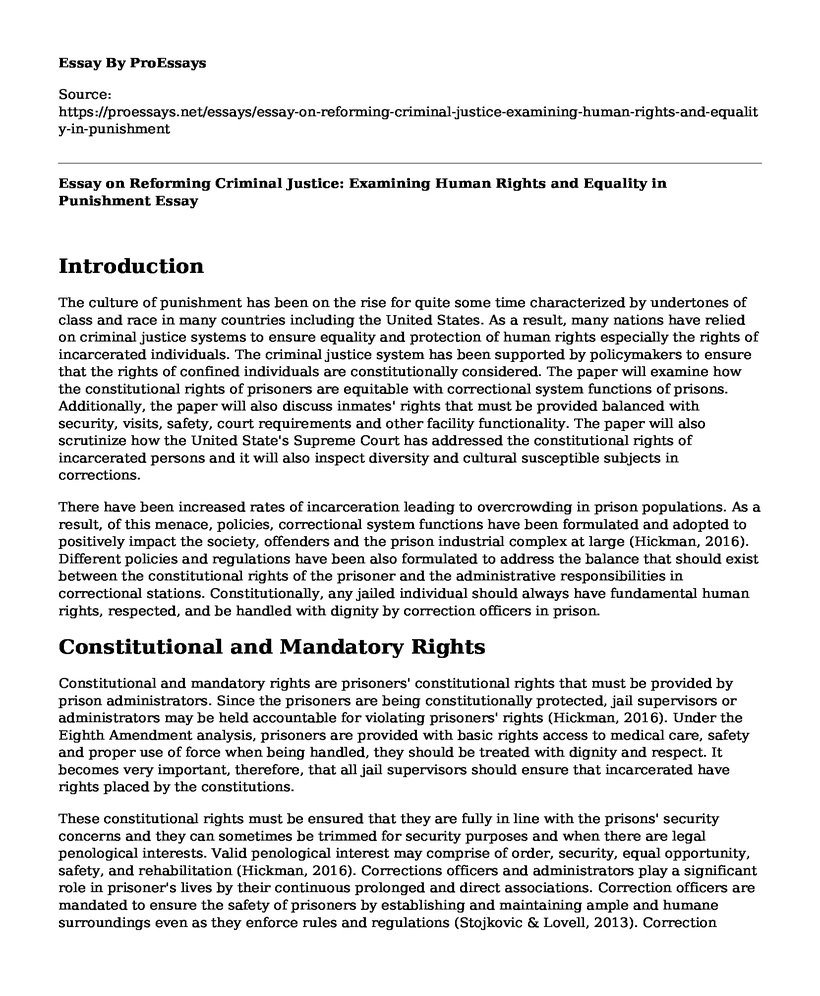Introduction
The culture of punishment has been on the rise for quite some time characterized by undertones of class and race in many countries including the United States. As a result, many nations have relied on criminal justice systems to ensure equality and protection of human rights especially the rights of incarcerated individuals. The criminal justice system has been supported by policymakers to ensure that the rights of confined individuals are constitutionally considered. The paper will examine how the constitutional rights of prisoners are equitable with correctional system functions of prisons. Additionally, the paper will also discuss inmates' rights that must be provided balanced with security, visits, safety, court requirements and other facility functionality. The paper will also scrutinize how the United State's Supreme Court has addressed the constitutional rights of incarcerated persons and it will also inspect diversity and cultural susceptible subjects in corrections.
There have been increased rates of incarceration leading to overcrowding in prison populations. As a result, of this menace, policies, correctional system functions have been formulated and adopted to positively impact the society, offenders and the prison industrial complex at large (Hickman, 2016). Different policies and regulations have been also formulated to address the balance that should exist between the constitutional rights of the prisoner and the administrative responsibilities in correctional stations. Constitutionally, any jailed individual should always have fundamental human rights, respected, and be handled with dignity by correction officers in prison.
Constitutional and Mandatory Rights
Constitutional and mandatory rights are prisoners' constitutional rights that must be provided by prison administrators. Since the prisoners are being constitutionally protected, jail supervisors or administrators may be held accountable for violating prisoners' rights (Hickman, 2016). Under the Eighth Amendment analysis, prisoners are provided with basic rights access to medical care, safety and proper use of force when being handled, they should be treated with dignity and respect. It becomes very important, therefore, that all jail supervisors should ensure that incarcerated have rights placed by the constitutions.
These constitutional rights must be ensured that they are fully in line with the prisons' security concerns and they can sometimes be trimmed for security purposes and when there are legal penological interests. Valid penological interest may comprise of order, security, equal opportunity, safety, and rehabilitation (Hickman, 2016). Corrections officers and administrators play a significant role in prisoner's lives by their continuous prolonged and direct associations. Correction officers are mandated to ensure the safety of prisoners by establishing and maintaining ample and humane surroundings even as they enforce rules and regulations (Stojkovic & Lovell, 2013). Correction officers must also ensure that they balance their security obligations and roles to make use of association with incarcerates to change their attitude and behaviors (Stojkovic & Lovell, 2013). With the established association, they can utilize many forms of corrections such as rehabilitation and reintegration. This approach proves to be most effective to both the society and prison system due to its constructive and positive effects of encountering criminal offenders.
An example of the United States's Supreme Court case upholding such instances, is the case of Brown v. Plata. From this case, we find that the constitutional rights of the prisoners were infringed based on the Supreme Court ruling. There are rights that are taken away when an individual commits a crime and freedoms they give up, however, they still enjoy the protection provided by the constitution of the United States. In the case above, the Supreme Court had a ruling that overcrowding and situations that lead to overpopulation itself had to be resolved, setting the maximum capacity of prisons and compliable time with the verdict (Hickman, 2016). As a result, California minimized its prison capacity to up to acceptable capacity levels. Offenders, on the other hand, were allowed to have access to proper mental and medical health care as per constitutional levels.
Issues of Diversity and Cultural Sensitivity
Diversity and cultural sensitivity issues within correctional systems are very different and vary from one state to another. Prisoners in incarceration are vastly different and come from different settings and cultures. Therefore, the adoption of extremely diverse traditions within incarceration settings may lead to violence, prejudice, racism, intolerance, and extremisms among the inmates (Stojkovic & Lovell, 2013). Additionally, in prison settings, prisoners are of different religions, and ethnicities, therefore, some prisoners' rights may be violated at the expense of others based on the facts they may not be sharing the same culture and come from the same background (Hickman, 2016).
Conclusion
In correctional settings, inmates do not retain all their constitutional rights usually assured to ordinary citizens. Therefore, some of their rights are being restricted by prison administrators to ensure security and rehabilitation, which are the main objectives of incarceration are obtained. Policies and regulations are established to ensure inmates' rights are express in different ways. When these policies and regulations are disputed in the court of law on constitutional grounds, it becomes the responsibility of the court to determine whether restrictions applied to inmates' rights are judicious.
References
Hickman, T. (2016). Adjudicating constitutional rights in administrative law. University Of Toronto Law Journal, 66(1), 121-171. https://doi.org/10.3138/utlj.3239
Stojkovic, S., & Lovell, R. (2013). Corrections: An introduction. San Diego, CA: Bridgepoint Education, Inc
Cite this page
Essay on Reforming Criminal Justice: Examining Human Rights and Equality in Punishment. (2023, Apr 24). Retrieved from https://proessays.net/essays/essay-on-reforming-criminal-justice-examining-human-rights-and-equality-in-punishment
If you are the original author of this essay and no longer wish to have it published on the ProEssays website, please click below to request its removal:
- Article Analysis Essay on Criminal Justice
- Comparison Between the Ring of Gyges Story and John Stuart Mill: The Theme of Justice
- Hot Coffee Documentary: Summary Paper Example
- Goldberg v. Kelly (1970) Case Study Paper Example
- Reforming Criminal Activity: Examining Correctional Systems & Victims - Essay Sample
- Essay Example on Law Enforcement: Fighting Crime with Lethal & Nonlethal Weapons
- Essay Example on Health Care, Social Justice, and Ms. Lauder







